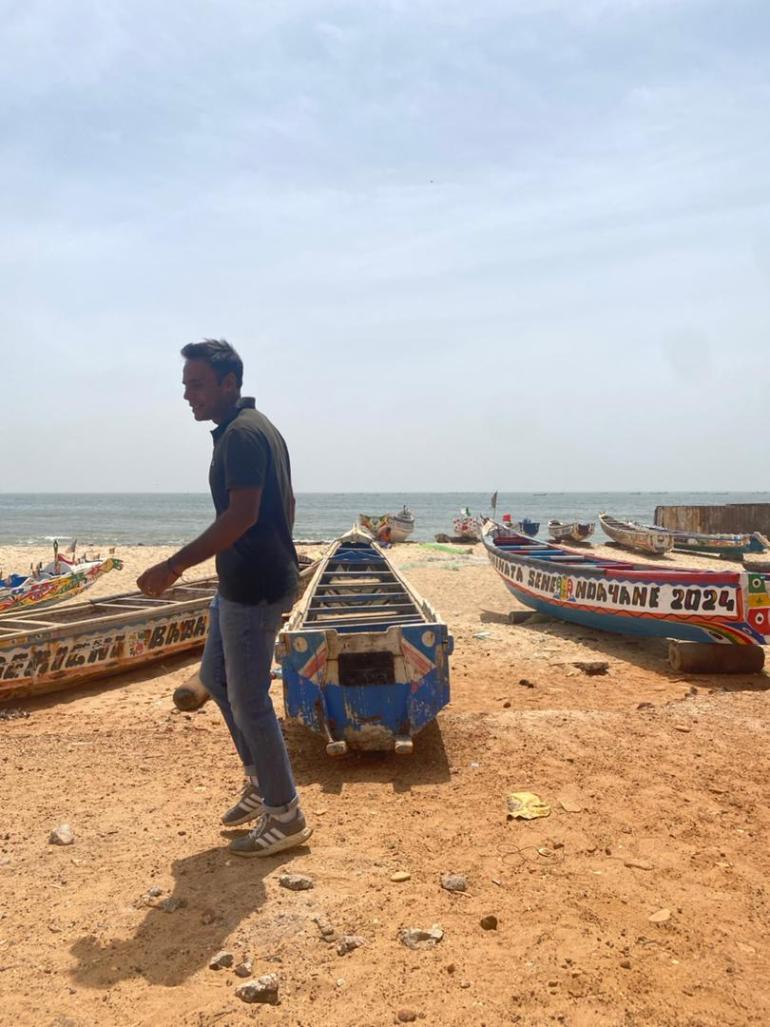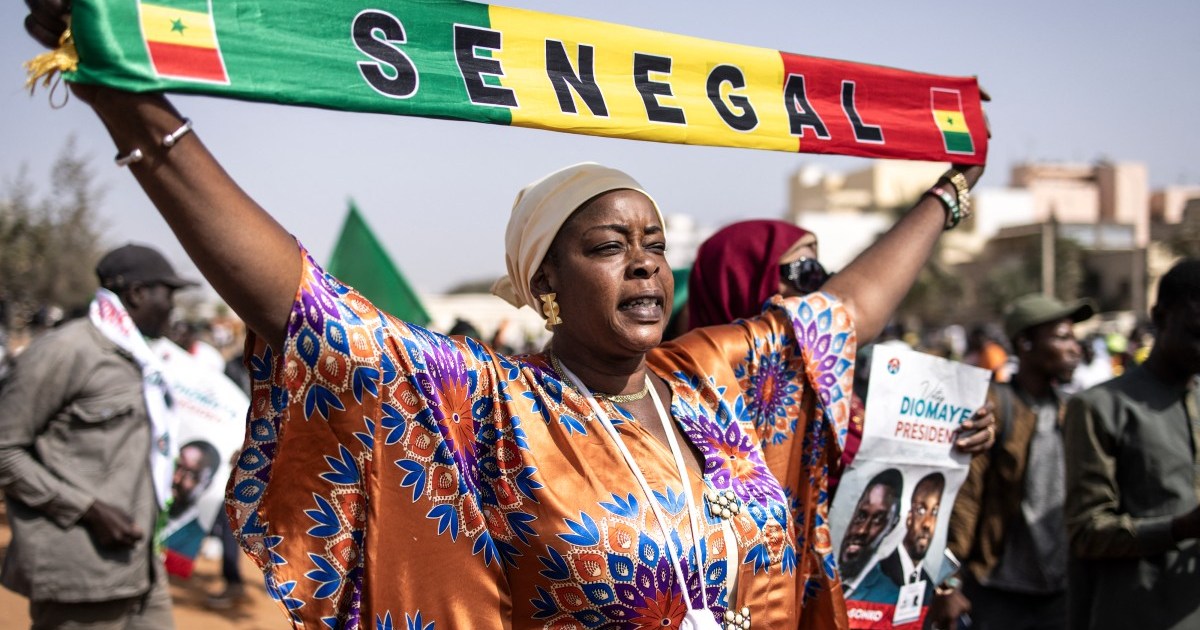Popenguine-Ndayane is home to me.
This small fishing village on the Atlantic coast some 100km (62 miles) from Senegal’s capital, Dakar, is a site of pilgrimage for the country’s Christian minority.
For the past 135 years, pilgrims – including the pope – have travelled here to pray at a site where they say the Black Madonna appeared.
Some believe miracles happen in this village.
It is a place where the sick come to be cured.
Politicians also come here to get elected.
Their campaigns arrive with blaring mbalax music – the popular dance tunes of Senegal – free T-shirts, and sometimes handfuls of cash and a promise that if you “vote for us, your despair will turn to hope”.
“Politicians think they can make miracles,” one of my neighbours tells me with a hint of irony.
Senegalese voters are not duped though.
Macky Sall’s announcement
Voting is a tradition that precedes French colonial rule in Senegal: From the poet-President Leopold Sedar Senghor down to the current presidency of Macky Sall, there have only ever been peaceful transitions of power.
That is a source of pride for Senegal, which is surrounded by countries ruled by military governments. Niger, Burkina Faso, Mali – one after the other – the former French colonies in West Africa that became democracies are falling; a domino effect that has spared this small coastal nation of approximately 17 million.
Situated on the most westerly tip of Africa, Senegal remains standing as a bastion of democracy.
But then came that Saturday afternoon in early February when, just hours before the presidential election campaign was scheduled to kick off, journalists were told the president would address the nation.
Sensing trouble, colleagues called me. We were incredulous as we waited. We watched an old man play a traditional instrument until the president was ready to make his address.
Hours had passed. It seemed like a bad omen, or perhaps a distraction.
Then the national anthem played and President Sall appeared.
A colleague, her husband, and an entire nation – including the family dog – stood still in silence, ears alert and listening as the president made history for all the wrong reasons.
He was cancelling the presidential elections, and by doing so, he was also throwing Senegal into uncertainty.
‘Orchestrating a constitutional coup’
The president claimed that the process by which the list of election candidates was drawn up by the country’s constitutional council was flawed. Judges from the council, he continued, were suspected of taking bribes to eliminate candidates from running in the election, thus putting into doubt the outcome of the vote.
Some sighed in resignation. Others burst into fits of anger. Our family dog barked with rage.

We had seen it coming, though.
Months before the polls, Sall – always a shrewd politician – had left his intention ambiguous as to whether he would run for a third mandate as president.
Julie Sagna watched Sall’s speech at home.
At the age of 32, she had never taken the time to vote. But when members of Senegal’s security forces stormed the National Assembly, throwing members of the opposition out, she knew that she was being robbed of a fundamental right that she had long taken for granted.
“I couldn’t believe it,” she said.
“The president is orchestrating a constitutional coup to extend his time in power!”
Sagna took to TikTok to fight back. Others clashed with security forces.
After political manoeuvres and street protests, the Constitutional Council stepped in, announcing a new election date of March 24.
That shortened the campaigning period to two weeks, but scheduled the vote to be held before Sall’s mandate as president ended on April 2.
Campaigning
Meanwhile, Sall, seeing his reputation crumble on the international scene, signed an amnesty bill to free what human rights groups describe as political prisoners. Thousands were released, including opposition leader Ousmane Sonko and his deputy Bassirou Diomaye Faye – the election candidate representing the banned political party PASTEF.
But the campaign had started without him.
Getting a head start in canvassing voters was the governing party’s candidate and former prime minister, Amadou Ba.
Ba crisscrossed the nation with a throng of bodyguards and with the well-oiled machine of the state apparatus to support him. Several reputable PR firms from the West were also tasked with making him appear a man of the people, ready to deliver stability.
A former tax inspector who became prime minister, Ba is an experienced civil servant. But he has never been elected to office. During the 2022 parliamentary elections, he lost to the banned PASTEF party’s candidate in his home district of Parcelles Assainies. Yet, despite that defeat, he is the candidate of choice of President Sall.
Described by his critics as the “billionaire civil servant” – billions in local West African CFA franc currency, that is – the opposition accuse Ba of being another corrupt politician trying to make a buck by becoming president.
Ba’s former employee – and also a tax inspector – Bassirou Diomaye Faye is running against him after his recent release from prison.
During a weeklong campaign supported by opposition figure Ousmane Sonko, Faye has gone from unknown contender to political stardom. He was seen on top of a car, waving a traditional broom – symbolising his intent to sweep the country clean of corruption and also sweep to victory. As the anti-establishment candidate, Faye is calling for an overhaul of the political system.
For many young people, including Julie Sagna, Faye is a break with the past that young people feel they need to move the country forward.
Where elections are won
In Mbour – located not far from the pilgrimage village of Popenguine-Ndayane – Faye held his final campaign rally in front of a raucous crowd.
Among those who attended, many were young men. It is uncertain whether they will come out to vote in the election on Sunday. Many do not have voter registration cards.
Missing from Faye’s rallies was a key demographic: Senegalese women from the countryside.
Their vote can tip the outcome.
“It is away from the bustle of the capital or the blaring caravans of candidates, deep in the countryside beneath the village tree that elections are won in Senegal,” a traditional village healer tells me.
In Popenguine-Ndayane there is talk among the local women of a country they feel is no longer their own. A record number of mostly young Senegalese men travelled to Europe illegally in 2023. They went in search of work despite a booming economy at home. The mothers and sisters of Popenguine-Ndayane do not want to see their sons and brothers leave.
Like the Black Madonna that pilgrims come to venerate here, Senegal’s women can also make miracles happen at election time.
But, more than the free T-shirts and cash given to win their votes, what they want to see most of all is certainty in times of uncertainty.
Check out our Latest News and Follow us at Facebook
Original Source

